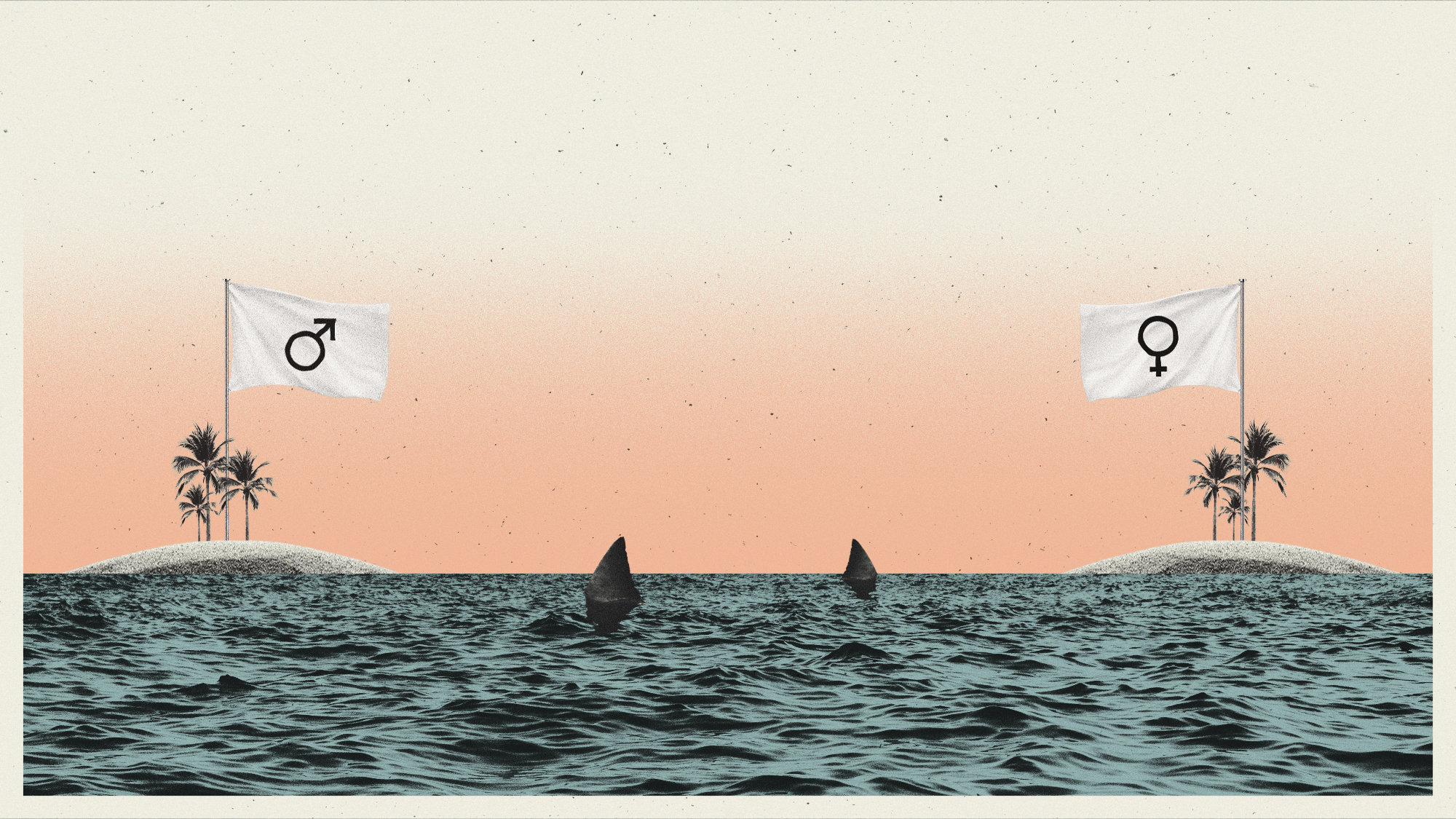2024: the year of the gender divide
A growing ideological rift between young men and women was felt on a global scale this year


A free daily email with the biggest news stories of the day – and the best features from TheWeek.com
You are now subscribed
Your newsletter sign-up was successful
It is somewhat common for men and women to split on political ideologies, but this year that gap seemed to widen. Playing out in both politics and romantic relationships alike, a rift between men and women grew in 2024. Echo chambers on social media and feelings of political alienation on both sides of the divide have expanded the distance between the two groups, especially among Generation Z.
A growing ideological chasm
Men and women have historically leaned right and left, respectively, but the ideological divide among the youngest voters, Generation Z, has become more pronounced than in other generations. Backlash toward gender equality and feminist movements may be drawing more young men aged 18 to 29 worldwide. "There is a growing concern among young men that maybe DEI [diversity, equity, and inclusion] is going too far," Alice Evans, a senior lecturer at King's College, said to The Guardian. Some men "question if women's gains are coming at the expense of them."
The findings of a March 2024 Ipsos study echoed that shift. With data samples from around the world, including Australia, Brazil, France, Germany, Japan, South Korea and Turkey, researchers found that regarding gender equality, those aged 18 to 29 had the most significant differences of opinion between the sexes.
The Week
Escape your echo chamber. Get the facts behind the news, plus analysis from multiple perspectives.

Sign up for The Week's Free Newsletters
From our morning news briefing to a weekly Good News Newsletter, get the best of The Week delivered directly to your inbox.
From our morning news briefing to a weekly Good News Newsletter, get the best of The Week delivered directly to your inbox.
The shifts in ideologically opposing directions for men and women under 30 are creating a complex generation that can skew either conservative or liberal on various issues. Due to that "great gender divergence," Gen Z is more like "two generations, not one," the Financial Times said. "Tens of millions of people who occupy the same cities, workplaces, classrooms and even homes no longer see eye to eye." Gallup data in the U.S. shows that after decades of being spread nearly equally, "women aged 18 to 30 are now 30 percentage points more liberal than their male contemporaries." That gap "took just six years to open up."
There could be several factors exasperating that chasm, including DEI initiatives, the #Metoo movement, the loneliness epidemic and draconian abortion laws taking effect post-Roe v. Wade. Social media echo chambers, like the manosphere, are also having an impact on the increasingly political gender wars.
"It's social media filter bubbles and cultural entrepreneurs," Evans said to the Guardian. People can "self-select into their preferences," and the "corporate algorithm kicks in to keep you hooked," feeding you content similar to what users like you watched. This has led to the "siloing of spaces, the erosion of shared experiences and resentment of gender equality efforts," which will cause "huge, intractable problems that go beyond the latest election cycle," the Guardian said.
The gender divide played out in politics
In the U.S., the divide among young voters became a central concern going into the 2024 Presidential election. President-elect Donald Trump's campaign embraced many groups who felt alienated by the Democrats, including young men. With his impending return to the White House, commentators urged the Democratic party to "confront a historic shift in voting patterns" this year, which saw "Latinos, the working class and Black men all shift rightwards in 2024," said the Guardian.
A free daily email with the biggest news stories of the day – and the best features from TheWeek.com
Perhaps the most striking shift was among young men as "men aged between 18 and 29 turned out in force for Trump." Trump's victory over this cohort is "one part of an unprecedented phenomenon across the world" in which the "politics of a single generation has split across the gender divide." Trump's "seismic win" among young men was "mirrored almost inversely by Kamala Harris' huge, 18-point win among young women."
The U.S. is not unique in that regard: "Political polarization between the genders has been growing among young people across the globe." South Korea's 2022 presidential election showed a wider gap between men and women voters among those aged 18 to 29 related to votes for the conservative-leaning People's Power party. Similar patterns emerged within that age range in the 2024 U.K. general election and in recent surveys of German voters.
Eroding interpersonal relationships
The social ramifications of this phenomenon manifested in declining fertility rates and fewer marriages, creating economic issues that have inspired governments worldwide to intervene. Many have launched efforts to encourage couples to have more children, with policies targeting the cost of childcare and housing shortages.
In America, the "heightened salience of gender" in 2024 has been "readily evident in the immediate aftermath of the election," said ABC News, as many people believed the "parties' messages pitted men against women." Far-right commentator Nick Fuentes went viral using the phrase "your body, my choice," which had "taken hold as a post-election victory cry" among young men.
On the other hand, some women on social media embraced the South Korean 4B movement. The women of that movement have sworn off men, choosing to abide by four principles: no sex, no childbirth, no dating and no marriage. Whether this drastic approach will take hold stateside remains to be seen, but the gender divide shows little signs of closing soon.
Theara Coleman has worked as a staff writer at The Week since September 2022. She frequently writes about technology, education, literature and general news. She was previously a contributing writer and assistant editor at Honeysuckle Magazine, where she covered racial politics and cannabis industry news.
-
 Political cartoons for February 15
Political cartoons for February 15Cartoons Sunday's political cartoons include political ventriloquism, Europe in the middle, and more
-
 The broken water companies failing England and Wales
The broken water companies failing England and WalesExplainer With rising bills, deteriorating river health and a lack of investment, regulators face an uphill battle to stabilise the industry
-
 A thrilling foodie city in northern Japan
A thrilling foodie city in northern JapanThe Week Recommends The food scene here is ‘unspoilt’ and ‘fun’
-
 ICE eyes new targets post-Minnesota retreat
ICE eyes new targets post-Minnesota retreatIn the Spotlight Several cities are reportedly on ICE’s list for immigration crackdowns
-
 Gavin Newsom and Dr. Oz feud over fraud allegations
Gavin Newsom and Dr. Oz feud over fraud allegationsIn the Spotlight Newsom called Oz’s behavior ‘baseless and racist’
-
 ‘Implementing strengthened provisions help advance aviation safety’
‘Implementing strengthened provisions help advance aviation safety’Instant Opinion Opinion, comment and editorials of the day
-
 Businesses are caught in the middle of ICE activities
Businesses are caught in the middle of ICE activitiesIn the Spotlight Many companies are being forced to choose a side in the ICE debate
-
 ‘One day fentanyl will come back — and there will be little anyone can do’
‘One day fentanyl will come back — and there will be little anyone can do’Instant Opinion Opinion, comment and editorials of the day
-
 Venezuela’s Trump-shaped power vacuum
Venezuela’s Trump-shaped power vacuumIN THE SPOTLIGHT The American abduction of Venezuelan President Nicolás Maduro has thrust South America’s biggest oil-producing state into uncharted geopolitical waters
-
 Wave of cancellations prompts Kennedy Center turmoil
Wave of cancellations prompts Kennedy Center turmoilIN THE SPOTLIGHT Accusations and allegations fly as artists begin backing off their regularly scheduled appearances
-
 The MAGA civil war takes center stage at the Turning Point USA conference
The MAGA civil war takes center stage at the Turning Point USA conferenceIN THE SPOTLIGHT ‘Americafest 2025’ was a who’s who of right-wing heavyweights eager to settle scores and lay claim to the future of MAGA
